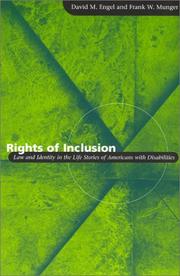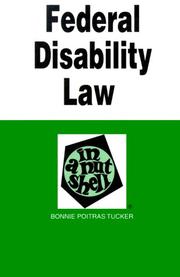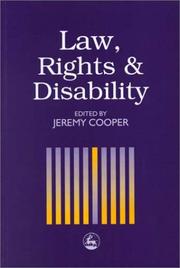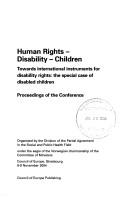| Listing 1 - 7 of 7 |
Sort by
|
Book
ISBN: 9781841138282 1841138282 Year: 2008 Publisher: Oxford: Hart,
Abstract | Keywords | Export | Availability | Bookmark
 Loading...
Loading...Choose an application
- Reference Manager
- EndNote
- RefWorks (Direct export to RefWorks)
The concept of reasonable adjustment (alternatively known as reasonable accommodation) is rapidly gaining significance for countries throughout Europe and beyond. Directive 2000/78 required all EU Member States to ensure that, by the end of 2006 at the latest, reasonable accommodation obligations would operate to protect disabled people from unequal treatment in the context of employment. The new United Nations Convention on the Rights of Persons with Disabilities will require ratifying States to impose such obligations in a broad range of situations.This book provides a detailed and critical analysis of the current and potential role of reasonable adjustment duties in British law. It explores the notion of the anticipatory reasonable adjustment duty - a notion which is, in many respects, distinctively British. It probes the relationship between reasonable adjustment and other concepts, including indirect discrimination and positive discrimination. Drawing particularly on US debates, potential sources of resistance to the duties are exposed and an attempt is made to suggest pre-emptive counter strategies. Attention is also given to issues of legal reform and rationalisation - issues of immense topicality and importance in view of the recent British move towards a single Equality Act. In short, this book examines the current and potential role of reasonable adjustment duties in Britain. It will be of interest to lawyers, policy-makers and students working in the field of disability rights. It will also be of interest to all those concerned with the operation and development of equality law and policy more generally, both in Britain and beyond
Human rights --- Social law. Labour law --- United Kingdom --- People with disabilities --- Discrimination against people with disabilities --- Discrimination in employment --- Legal status, laws, etc. --- Law and legislation --- Government policy --- Civil rights --- People with disabilities - Legal status, laws, etc. - Great Britain. --- Discrimination against people with disabilities - Law and legislation - Great Britain. --- Discrimination in employment - Government policy - Great Britain. --- People with disabilities - Civil rights - Great Britain.
Book
ISBN: 9789221201441 9221201449 9221201457 9789221201458 Year: 2007 Publisher: Geneva, Switzerland International Labour Office
Abstract | Keywords | Export | Availability | Bookmark
 Loading...
Loading...Choose an application
- Reference Manager
- EndNote
- RefWorks (Direct export to RefWorks)
This publication provides an invaluable overview of the principal international legal instruments, policies and initiatives of relevance to the rights of people with disabilities, with a particular focus on employment and work. It focuses on the different options available to people with disabilities who wish to work in open/competitive employment, sheltered employment, supported employment and social enterprises and examines the trends in each of these categories, highlighting the key issues faced in each case.
People with disabilities --- Discrimination against people with disabilities --- Handicapés --- Discrimination à l'égard des handicapés --- Employment --- Law and legislation. --- Travail --- Droit --- Discrimination against people with disabilities -- Law and legislation. --- People with disabilities -- Employment -- Law and legislation. --- People with disabilities -- Services for. --- Law, Politics & Government --- Law, General & Comparative --- Law and legislation --- Handicapés --- Discrimination à l'égard des handicapés --- Labor laws and legislation

ISBN: 0226208346 9780226208343 0226208311 9780226208312 0226208338 9780226208336 Year: 2003 Publisher: Chicago: University of Chicago press,
Abstract | Keywords | Export | Availability | Bookmark
 Loading...
Loading...Choose an application
- Reference Manager
- EndNote
- RefWorks (Direct export to RefWorks)
Rights of Inclusion provides an innovative, accessible perspective on how civil rights legislation affects the lives of ordinary Americans. Based on eye-opening and deeply moving interviews with intended beneficiaries of the Americans with Disabilities Act (ADA), David M. Engel and Frank W. Munger argue for a radically new understanding of rights-one that focuses on their role in everyday lives rather than in formal legal claims.Although all sixty interviewees had experienced discrimination, none had filed a formal protest or lawsuit. Nevertheless, civil rights played a crucial role in their lives. Rights improved their self-image, enhanced their career aspirations, and altered the perceptions and assumptions of their employers and coworkers-in effect producing more inclusive institutional arrangements. Focusing on these long-term life histories, Engel and Munger incisively show how rights and identity affect one another over time and how that interaction ultimately determines the success of laws such as the ADA.
People with disabilities --- Discrimination against people with disabilities --- Civil rights --- Legal status, laws, etc. --- Law and legislation --- People with disabilities - Civil rights - United States --- People with disabilities - Legal status, laws, etc. - United States --- Discrimination against people with disabilities - Law and legislation - United States --- People with disabilities - United States - Biography

ISBN: 0314226281 9780314226280 Year: 1998 Publisher: St Paul (Minn.): West group,
Abstract | Keywords | Export | Availability | Bookmark
 Loading...
Loading...Choose an application
- Reference Manager
- EndNote
- RefWorks (Direct export to RefWorks)
People with disabilities --- Discrimination against people with disabilities --- Legal status, laws, etc --- Law and legislation --- -People with disabilities --- -Cripples --- Disabled --- Disabled people --- Disabled persons --- Handicapped --- Handicapped people --- Individuals with disabilities --- People with physical disabilities --- Persons with disabilities --- Physically challenged people --- Physically disabled people --- Physically handicapped --- Persons --- Disabilities --- Sociology of disability --- Discrimination against the handicapped --- -Legal status, laws, etc --- People with disabilities - Legal status, laws, etc - United States --- Discrimination against people with disabilities - Law and legislation - United States

ISBN: 1280537973 9786610537976 1846421225 1417552794 9781417552795 9781846421228 9781280537974 1853028363 9781853028366 6610537976 Year: 2003 Publisher: London: Kingsley,
Abstract | Keywords | Export | Availability | Bookmark
 Loading...
Loading...Choose an application
- Reference Manager
- EndNote
- RefWorks (Direct export to RefWorks)
This comprehensive volume assesses the relationship between legal rights and disability and the effect of law, legal process and third party professional intervention on the lives of people with disabilities. Stressing the crucial role played by disabled people themselves in fulfilling the promise of the worldwide rights movement, the chapters examine this relationship across a variety of themes, stressing the legal elements of each issue, and the extent to which law can assist in strengthening individual rights in that area. The contributors, who are all either academics or other professional experts in their field, write in a jargon free accessible style. The volume will be of interest to lawyers, human rights activists, health care professionals and to disabled people generally. The main areas covered in the volume are: new perspectives on working in partnership with disabled people; the changing attitudes to the rights of people with disabilities across the globe; improvements to the rights of disabled people through legal process, using national and international law; an examination of the rights and entitlement of disabled people to community care, housing, employment, education, and special services for children; disabled people and mental health law; messages from disability research for law, practice and reform implications for research.
People with disabilities --- Discrimination against people with disabilities --- Ableism --- Discrimination against the handicapped --- Cripples --- Disabled --- Disabled people --- Disabled persons --- Handicapped --- Handicapped people --- Individuals with disabilities --- People with physical disabilities --- Persons with disabilities --- Physically challenged people --- Physically disabled people --- Physically handicapped --- Persons --- Disabilities --- Sociology of disability --- Legal status, laws, etc. --- Law and legislation --- People with disabilities - Legal status, laws, etc. - Great Britain. --- Discrimination against people with disabilities - Law and legislation - Great Britain.

ISBN: 9287158738 9789287158734 Year: 2006 Publisher: Strasbourg: Council of Europe,
Abstract | Keywords | Export | Availability | Bookmark
 Loading...
Loading...Choose an application
- Reference Manager
- EndNote
- RefWorks (Direct export to RefWorks)
Children with disabilities --- Discrimination against people with disabilities --- Human rights --- Family relationships --- Government policy --- Legal status, laws, etc. --- Law and legislation --- Legal status, laws, etc --- Ableism --- Discrimination against the handicapped --- People with disabilities --- Children with special educational needs --- Children with special health care needs --- Children with special needs --- Handicapped children --- Physically handicapped children --- Special needs children --- Exceptional children --- Children with disabilities - Legal status, laws, etc. - Europe - Congresses. --- Children with disabilities - Family relationships - Europe - Congresses. --- Children with disabilities - Government policy - Europe - Congresses. --- Discrimination against people with disabilities - Law and legislation - Europe - Congresses. --- Human rights - Europe - Congresses.
Book
ISBN: 9780814740576 9780814783610 081474057X 0814783619 081474088X 1441622918 0814708870 Year: 2009 Publisher: New York (N.Y.): New York University press,
Abstract | Keywords | Export | Availability | Bookmark
 Loading...
Loading...Choose an application
- Reference Manager
- EndNote
- RefWorks (Direct export to RefWorks)
In the late-nineteenth and early-twentieth centuries, municipal laws targeting "unsightly beggars" sprang up in cities across America. Seeming to criminalize disability and thus offering a visceral example of discrimination, these "ugly laws" have become a sort of shorthand for oppression in disability studies, law, and the arts. In this watershed study of the ugly laws, Susan M. Schweik uncovers the murky history behind the laws, situating the varied legislation in its historical context and exploring in detail what the laws meant. Illustrating how the laws join the history of the disabled and the poor, Schweik not only gives the reader a deeper understanding of the ugly laws and the cities where they were generated, she locates the laws at a crucial intersection of evolving and unstable concepts of race, nation, sex, class, and gender. Moreover, she explores the history of resistance to the ordinances, using the often harrowing life stories of those most affected by their passage. Moving to the laws' more recent history, Schweik analyzes the shifting cultural memory of the ugly laws, examining how they have been used - and misused - by academics, activists, artists, lawyers, and legislators.
#SBIB:39A9 --- People with disabilities --- Beggars --- Discrimination against people with disabilities --- Mendicants --- Panhandlers --- Street people (Beggars) --- Poor --- Cripples --- Disabled --- Disabled people --- Disabled persons --- Handicapped --- Handicapped people --- Individuals with disabilities --- People with physical disabilities --- Persons with disabilities --- Physically challenged people --- Physically disabled people --- Physically handicapped --- Persons --- Disabilities --- Sociology of disability --- Discrimination against the handicapped --- Medische antropologie / gezondheid / handicaps --- Legal status, laws, etc. --- History. --- Law and legislation --- Ableism --- Legal status, laws, etc --- History --- Law and legislation&delete& --- Law and legislation&delete&&delete& --- People with disabilities - Legal status, laws, etc. - United States - History --- Beggars - Legal status, laws, etc. - United States - History --- Discrimination against people with disabilities - Law and legislation - United States - History --- People with disabilities - United States - History --- Beggars - United States - History --- Americas. --- chapter. --- hard. --- history. --- look. --- ugly.
| Listing 1 - 7 of 7 |
Sort by
|

 Search
Search Feedback
Feedback About UniCat
About UniCat  Help
Help News
News